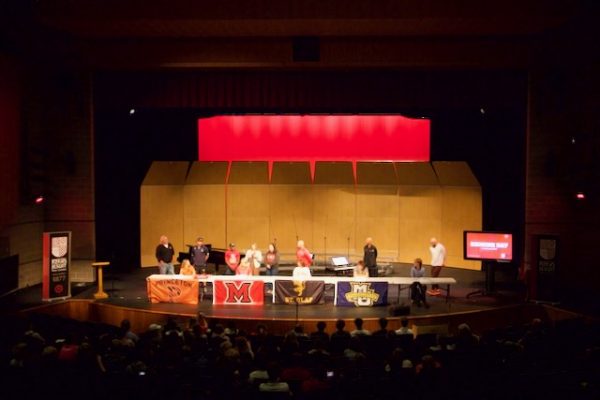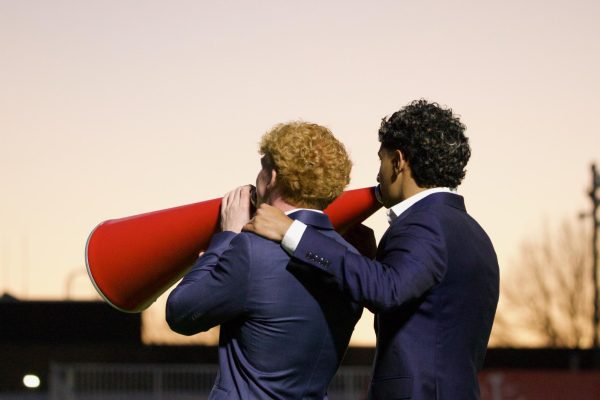Call to Action: Military Life After High School
It’s October of your senior year. In retrospect, its the beginning of the rest of your life. The decisions you make in the upcoming months will dictate how the rest of your existence turns out.
Some people go to college and get a degree. That seems like most popular and the most fruitful option. But it isn’t an path that everyone can go down, at least initially.
College tuition continues to grow astronomically and a lot of students are looking for alternatives, such as scholarships and trade schools. Since the GI Bill was introduced, joining the military after high school has become a very common route for high school graduates.
Enlisting or joining the ROTC program have many benefits that make it hard to pass up.
One of the biggest is job security. In an age that seems to be defined by unemployment and economic downturn, joining the military provides a steady paycheck for as long as you want, providing you serve the minimum 4-6 years. Starting immediately, a private in the Army can make $20,000, dashing any worries of financial security.
To begin the process of actually enlisting (joining the military straight after high school), one must speak to an U.S. Army recruitment officer. There are many things that the Army must know before they allow you become a soldier. Some things are simple and obvious, like your name, birthday, and education level. But many other things are important too, like your legal history, medical history, and cultural background.
Sometimes you may even get a raise depending on your cultural ties, mostly in regards to your linguistic abilities. When the military is occupied in a foreign region, many times a language barrier springs up between the troops and the native peoples. For instance, the military is currently involved in combat in Afghanistan. The U.S. troops primarily speak English, which is to be assumed since that is their home language. But the military needs to be able to converse with Afghani citizens in order to do their job effectively. So if a recruit comes along and can speak Dari, the Afghani language, they would receive a pay raise.
The military puts a lot of value in certain skills. That is why going to the academy, gaining those skills, and then joining as an officer is such an attractive option for potential soldiers. One doesn’t always just go out on patrols and engage in firefights. Some of the most important members of the military are the technicians, engineers, and doctors, the people that make it possible for the foot soldiers to do their job.
There is no tuition for the Military academies, but the admission requirements are quite elite. The military refuses to train anyone but the best. You first must excel in high school and your extracurricular activities, then you proceed to asking one of your state senators for a nomination. After a series of interviews, your fate is decided.
Profile: Regis Jesuit graduates Craig Berry ’10 & Heaven Maradiaga ’13
Choosing a life in the Military is huge decision. For Craig Berry and Heaven Maradiaga, a life in the military was worth pursuing.
Craig Berry, a Regis Jesuit Graduate from the class of 2010, has been in the Navy since August of his graduation year. Officially, he known as “Petty Officer Berry 3rd Class” and he is testing to become a Petty Officer 2nd class. But what contributed to him choosing a life in the military?
“It was a combination of a few things,” Berry said.” As I got into Junior and Senior year, I tossed around the idea of going to college and started looking at some universities I would like to go to. I also wanted to be a firefighter so I knew I wanted to go to college for something like fire science. I started visiting with a couple of connections that I had in some fire crews and I told a few of them I had the idea of going into the military. They told me that there were a lot of parallels between the military and firefighting community and that they look for ex-military personnel during the application process.”
For many high school students, Berry included, the military is a fantastic opportunity.
“The recruiter said that I could do four years in the Navy and get almost all of my college expenses paid for if I decided to get out and go to a university. Four years in the military would give me a small break from the classroom education world, pay for my college afterwards, make me look attractive as a potential fire fighter, give me thousands of work experience hours, and pay me while doing it. That was hard to pass up.”
The point here is that going into the military gives the graduating high school student options.
When asked about his future plans, Berry said that, “ My plan was to train, advance, and just do the best I could as an Avionics Technician. I also planned to burn up some of the Navy’s tuition assistance and get a little bit of a head start on my degree. Right now I am about 9 months from the end of my first four year enlistment. So I have to decide whether or not I’m going to get out of the military and go to college or if I’m going to reenlist for 2 or 4 years and see where I am at that point. I haven’t quite made a decision yet.”
For 2013 Regis Jesuit Grad Heaven Maradiaga, enlisting in the military suited her just as well.
“I kind of always wanted to be in the military, and it helped when I found out there was a reserve option so I could come back to Colorado,” Maradiaga said in an email interview.
Maradiaga works in communications within the military. After her training she plans to return to Colorado while going to college and still doing drills every month.

Profile: Regis Jesuit seniors Quincy Prark, Alec Christian & Dottie Deane
For current Regis Jesuit students, the choice of military life is a daunting one. Quincy Prark is a current Regis Jesuit senior with aspirations of West Point and the Air Force Academy. He credits Regis Jesuit with influencing his decision. Prark toyed with the idea of military life before, but made his decision in his sophomore year.
“Ultimately coming to Regis has influenced my decision,” Prark said. “Joining the military for me is kind of like service. It’s all about giving back and serving the people.”
Another RJ senior, Dottie Deane, is looking at West Point and Air Force as well and says she considered the military when her brother was looking at colleges.
“He got a brochure for the Air Force. I looked at it and I have always wanted to be a pilot,” Deane said. “His experiences led me to consider it.”
Prark is currently applying to military academies including West Point and the Air Force Academy. He said he can get the most military benefits out of going to a good academy.
“There are advantages that officers have rather than just generally enlisted people,” Prark said. “I definitely want to become an Aerospace Engineer or some sort of trade in terms of flight. Making aerospace weapon design, flying, and that kind of stuff. Stuff that only officers can do and that is something I want to take the advantage of.”
Senior Alec Christian had similar thoughts and knows ROTC is beneficial and that active enlistment and the academies are not for him.
“Active enlistment is not the best choice. Basically, if you cannot get into a good college, you choose to enlist,” Christian said. “If I go to college ROTC, I come out as a second lieutenant and that is just the best way to go.”
However, the decisions and acceptance are just the beginning. The military lifestyle is a difficult one. Quincy Prark believes he has been prepared for military life by his time at the Civil Air Patrol.
“Even though it is kind of like a kiddy version of the armed forces, it is still pretty serious,” Prark said, “we still embrace all the traditional Air Force values, it’s like its own JROTC.”
Dottie Deane believes she will fit into military life well because of her experience with challenge and discipline.
“I have always liked discipline. Being strict is a really good challenge and I like to be challenged in that way. I really like the discipline aspect and I think I can thrive off that,” Deane said.
But getting through the academy is just the first part. After that the students are required to serve some years in their military branch. Some students, however, are looking to make a long-term career out of the military.
“After my required years of active duty, I will probably stay in the military for a while,” Christian said. “If you come out a second lieutenant, its a good idea to stay a while.”
Quincy Prark has a more defined goal in terms of his future in the military and in flight programs.
“Ultimately if I can get into a flight program, like at the Air Force Academy, I will take that,” Prark said, “then spend about eight years flying in the Air Force and we will see where I will go from there.”
Choosing to go to the military after high school is a tough decision, but those who are passionate can go far. Whether they are actively enlisting, going to college ROTC, or attending an academy, these students and former students are continuing a life dedicated to service.






